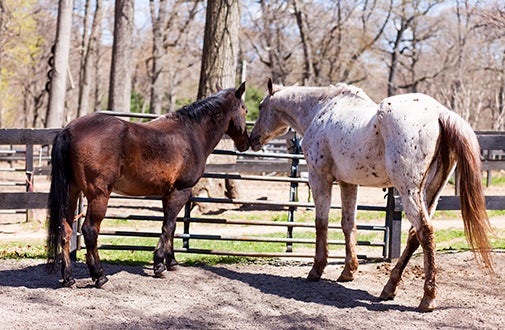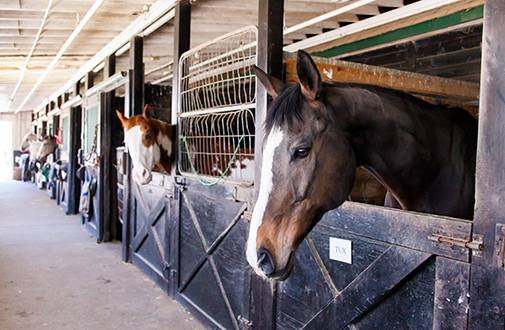
Horse Care


Are you bringing an equine friend into your family, or looking to brush up on your horse care skills? Read on for tips to keep your horse healthy and happy.
Nutritional Needs
A horse’s digestive system is designed to digest frequent, small meals of roughage throughout the day. The basic diet for most horses should be grass and good-quality hay, free of dust and mold. Clean, unfrozen water should be available at all times along with a trace mineral/salt block.
Expand to read more
How Much Food is Enough?
Ideally, a horse will have constant access to high-quality forage in the form of fresh grass or hay. An empty stomach lends itself to a higher risk of ulcers and other digestive issues. How much to feed depends on various factors such as condition and activity level, but most horses should eat between 2% and 2.5% of their body weight in pounds of hay and supplemented feeds daily. It is important to watch your horse and make sure he is maintaining an appropriate weight. Your veterinarian can help you decide how to feed to keep your horse fit and healthy.
- A word on grains: The bulk of the diet should almost always be roughage, but grain can be a useful supplement to hay to ensure you are meeting your horse’s caloric and nutritional needs. Less is often more and most horses, even active ones, only need several pounds of grain a day. Grains digest quickly, leaving the stomach empty and gasses in the intestines. Foals fed “high energy” diets can develop bone and joint problems. Some adult horses with certain muscle disorders can have their symptoms exacerbated by the high carbohydrates found in grain.
- Any changes to your horse’s diet should be made gradually to avoid colic (abdominal pain usually associated with intestinal disease) or laminitis (painful inflammation in the hoof associated with separation of the hoof bone from the hoof wall), either of which can be catastrophic. A horse or pony breaking into the grain bin or being allowed to gorge on green pasture for the first time since the fall could be headed for disaster. If you travel with your horse, bring his food along to avoid changes.
Vaccinations and Deworming
All horses need vaccinations and regular deworming. Vaccination recommendations vary based on age, the amount the horse travels and location, so it is best to consult with your veterinarian. To get a general idea of what vaccines you should expect to give your horse, visit the American Association of Equine Practitioner’s vaccination guidelines.
Worms can cause weight loss, poor coat and colic. It is best to have your veterinarian perform a fecal egg count test and advise you on which dewormers to use throughout the year. It is equally important to minimize your horse’s exposure to parasites. Proper management entails not putting too many horses on too little land, rotating pastures if possible, and removing manure regularly.
Housing, Rest and Exercise
Horses are social animals who are physiologically most sound when they have the ability to roam and interact with other horses. Of course, not all horses thrive in 24/7 turnout and not all horse owners have access to large areas of land. If your horse is stalled, be mindful of providing him socialization and enrichment opportunities, and provide daily turnout if possible. If your horse does live outside, make sure he has access to a safe shelter at all times.
Expand to read more
Horses can go into a light sleep with their legs “locked” so that it takes very little effort to remain standing. In order to achieve deep (REM or “dreaming”) sleep, a horse must lie flat. It is not known how much or how often a horse needs to do this, but do take note of any changes in your horse’s sleeping patterns.
Horses were born to move. In the wild they may walk many miles in a day, sometimes trot, but rarely gallop unless they have to. Daily opportunity to exercise is a must, but if you are building up your horse’s strength and conditioning, follow a sensible plan and do it gradually.
Extreme Weather Precautions
Unless it is very wet and windy, horses tolerate cold much better than heat and humidity. On hot and humid days, it is important to provide your horse with plenty of fresh water, minerals and access to adequate shade. In extreme heat, use caution and limit forced exercise. Likewise, during extreme cold weather, make sure your horse has access to shelter and the ability to protect himself from moisture and wind. Some horses may require a waterproof blanket for additional warmth.
Hoof Care
Hooves should be trimmed every six to eight weeks. Depending on your horse’s activity level, the environment and his body type, your horse may need shoes. Your farrier will be able to recommend the best course of action to keep your horse’s hooves strong and well-balanced.
Teeth
Horses’ teeth grow continuously. Uneven wear can lead to sharp points and edges that cause pain and difficulty chewing. A horse’s teeth should be checked once or twice a year and “floated” (filed to make them smoother) by a veterinarian. Dental problems, from painful points to rotting teeth, may cause difficulty chewing or “quidding,” which occurs when food falls out of the mouth. Other signs of dental disease may include foul breath, undigested hay in the stools or discomfort from the bit or noseband. Dental disease can lead to choke (esophageal blockage), colic and weight loss.
Equine Poison Prevention
Experts at the ASPCA Animal Poison Control Center have compiled a list of toxic plants for horses. Check out the following list for a few of the more common toxic plants you might encounter.
Expand to read more
- Wilted red maple leaves
- Black walnut (e.g., as shavings in bedding)
- Oak (especially new-growth leaves in the springtime)
- Taxus species (yew, Japanese yew, American yew, English yew, western yew, oleander and rose laurel)
- Rhododendron and azalea
- White snakeroot, richweed, white sanicle, jimmy weed, rayless goldenrod, burrow weed
- Yellow star thistle, St. Barnaby's thistle, Russian napweed
- Blister beetles, which can sometimes be found in alfalfa hay, especially in the Midwest and Southwest
If you suspect that your animal has ingested a poisonous substance, please call your veterinarian or the ASPCA Animal Poison Control Center's 24-hour hotline at (888) 426-4435.
